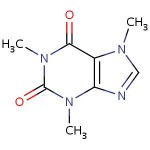Update, 5/30/2021: This old blog post recently got a lot of traffic which made me revisit the claim that as little as four grams of caffeine could be fatal.
What I would add to the (somewhat embarrassing) polemic below is that, well, it depends. While a potentially fatal caffeine dose for healthy adults appears to be in the 7 grams to 10 grams range, individuals with heart and other health conditions may be susceptible to severe problems from even smaller doses.
For example, in 2011, a young woman died after consuming two cans of Monster energy drink over a couple of days that contained a total of 480 milligrams of caffeine. The young woman suffered from several pre-existing heart conditions, including an enlarged heart, mitral valve prolapse, and myocardial fibrosis.
Monster disputed that the cause of death was “caffeine toxicity,” noting that the medical examiner who ruled that the death was caused by caffeine never actually performed any blood tests on the decedent.
As with all things, do not take medical advice from blogs like this. Talk with a physician about safe caffeine consumption.
In another case of everything-on-the-Internet-must-be-true, the widely-read Boing! Boing! is helping to publicize false health information from, of all places, the unreliable Erowid site which seems to promote, if not advocate, the use of psychoactive drugs.
The idiots at the Center for Science in the Public Interest are on one of their anti-caffeine binges and have an analysis of caffeine content in various products. Starbucks 16oz coffee grande tops the list with 550mg of caffeine.
Boing! Boing! then republishes the following comment from one of its readers as if it were accurate,
Reader comment: Aaron says:
I saw your caffine post and it reminded me that according to the Erowid drug information site, the L.D. 50 for caffeine (the amount that is lethal for 50% of a test population) is between one and four grams. So, according to the link you posted, a single grande coffee at Starbucks is just over half of the bottom of that range. It’s also worth noting that they list anything over 400mg as a “heavy” dose.
Okay, a dosage of one to four grams may kill you depending on your weight . . . if you inject that much caffeine intravenously.
If, like most of us, you get your caffeine through oral consumption of food and drinks, the lethal dose for adults starts at 7-10 grams depending on your weight, and increases from there the more you weigh. To start to get anywhere near a lethal dose of caffeine from Starbucks, most of us would be looking at a minimum of 9 or 10 of these 16 ounce drinks consumed very rapidly.
As Mrvos, et al noted in a case study of a woman who died from caffeine overdose from swallowing large numbers of diet pills,
Caffeine has long been recognized as an addictive substance with numerous toxic effects. Death due to caffeine overdose is rare, due in part to its marked gastric irritation resulting in spontaneous emesis.
That’s a scientifically correct way of saying that if you try to achieve a lethal dose of caffeine by downing lattes, the caffeine will give you an incredible stomach ache and you’ll wind up puking the caffeine on the floor long before you are even close to killing yourself.
A look at caffeine-related fatalities from PubMed makes clear that cases of caffeine fatalities are almost exclusively from excessive, often accidental, consumption of diet pills and other drugs.
